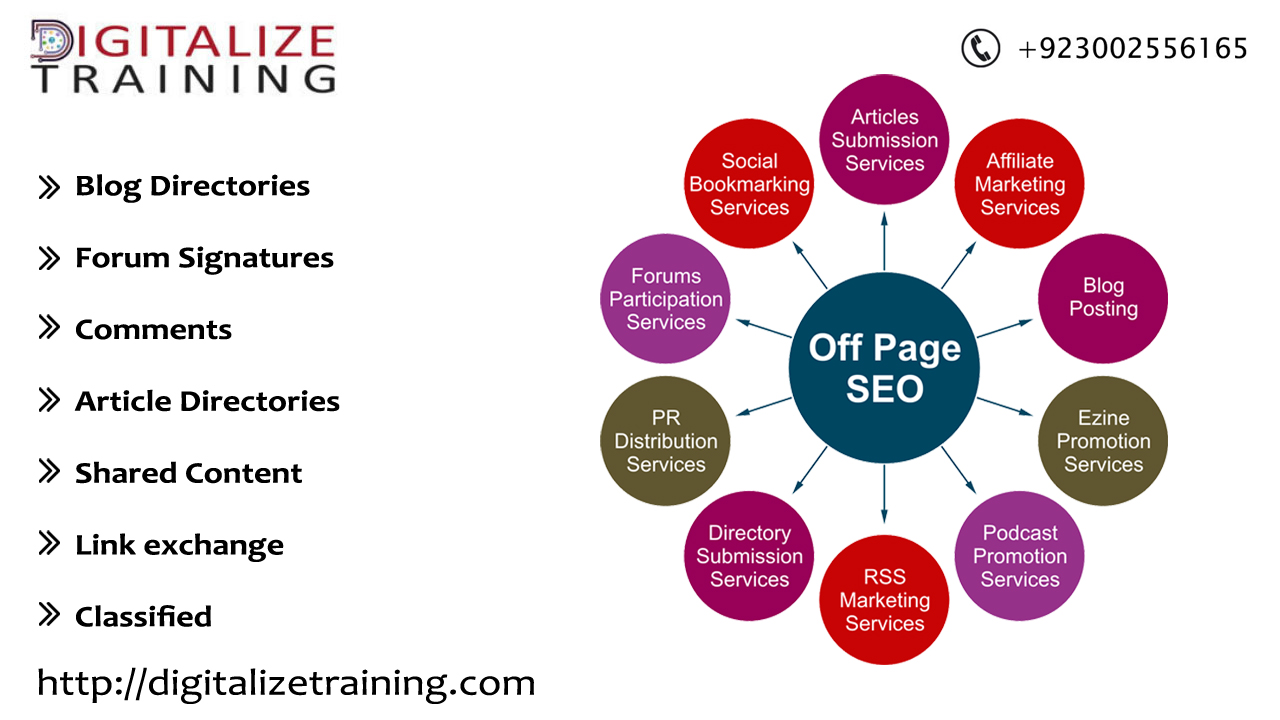Off-page SEO is a technique used to improve the ranking of the website on the search engine results page (SERP). Many people related off-page SEO with link building but it is not only that.
Off-Page SEO
As you know on-page SEO activities are the activities that you can perform on your website but off–page SEO is completely different. Here you have to perform activities on other websites. The following are the main factors of off-page SEO
- Link Building
- Social Media Marketing
- Brand Mentions

Importance of Off-Page SEO?
Search engines always try to give the best result to the searchers and to achieve a higher ranking on SERP off-page SEO plays an important role.
Off-page SEO practices indicate search engines how the other website and users recognize a particular website. A website with more quality backlinks has more chances to achieve a higher ranking on search engines.
Benefits of ‘Off-site SEO’ to website owners?
An outstanding off-Page SEO strategy or approach will give the following benefits to website owners:
Get Higher Rankings:
The website achieves a higher rank in the SERPs and drives more traffic.
Page Rank:
Page rank is a way to indicate the importance of a website. Page rank is between 0 to 10 for a website.
Establish Trustworthiness:
Recently Google has introduced the concept of E-A-T (Expertise, Authority, and Trustworthiness).
Link Building
Link building is one of the most popular and useful off-page SEO techniques. Normally, link building is a process to build links to your website, links are like votes, the more links the more chances to beat your competitors and rank higher.
From the day first, webmasters are trying to build links to their websites to achieve higher ranking and they are doing this in multiple ways. Some are mentioned below
-
- Blog Directories
- Forum Signatures
- Comments
- Article Directories
- Shared Content
- Link exchange schemes
- Classified
- Blog commenting
- and many more
Best off-page SEO Strategies
As we talked about earlier, when it comes to off-page SEO, it’s important to focus on building up your link profile and reputation. This means that you’ll want to look for opportunities to build links from other websites back to your own. Additionally, leveraging social media and partnering with influencers can be effective ways to establish your brand’s credibility and authority in the marketplace.
Here are some off-page SEO strategies that you should implement for a higher search engine ranking:
1. Develop High-Quality, Link-Worthy Content
Creating content that’s valuable, informative, and engaging is a crucial part of any successful SEO strategy. But it’s not just about putting words on a page – you also need to make sure that your content is something that people will want to link to and share. This means focusing on developing high-quality, link-worthy content that provides real value to your audience. By doing so, you’ll not only improve your website’s SEO, but you’ll also be more likely to attract new visitors and build a loyal following over time.
So, it’s clear that having a solid content strategy is crucial for any successful off-page SEO plan. And when it comes to creating content for off-page optimization, it’s important to think beyond just traditional blog posts and FAQs. By exploring different types of content, you can provide your audience with a more diverse range of resources that are both informative and engaging. This, in turn, can help boost your website’s authority and attract more links from other high-quality websites in your industry.
2. Perform a Backlink Audit
One of the most critical parts of your off-page SEO plan is conducting a backlink audit. While creating great content is an effective way to earn high-quality backlinks naturally, it’s important to keep an eye on all the backlinks you’ve accumulated. Some of them may actually be hurting your SEO efforts rather than helping. By auditing your backlinks regularly, you can identify any toxic links and take corrective measures to remove them. This way, you can ensure that the links pointing to your website are only of the highest quality and that they’re helping rather than harming your SEO.
3. Audit Your Backlink Anchor Texts
Back in 2012, Google shook up the world of SEO with the introduction of the Penguin update. This update was designed to penalize websites that used manipulative backlink schemes. As a result, anchor text optimization has become a critical part of any effective off-page SEO strategy.
The quality of your anchor text is vital as it determines the relevance and authority of a web page, both for backlinks and internal links. While you have control over the anchor text on your own site, it’s important to remember that other sites may not always be as careful when linking to you.
To ensure that your off-page SEO strategy is as effective as possible, it’s essential to audit all of the anchor text for links coming to your website. This means using a backlink checker tool to identify any less-than-ideal anchor text that others may be using to link to your pages. You’ll then need to reach out to those sites and request that they make changes.
While backlinks that use your brand and product names as anchor text can help establish the authority of your website, using too much of it can look suspicious. So, it’s essential to ensure that people are using a good mix of your target keywords, brand name, and other relevant phrases when linking to your site. This can help ensure that your off-page SEO efforts are working to their fullest potential.
4. Leverage Influencer Marketing
Influencers have become an increasingly popular marketing tool for brands, and it’s highly recommended that you include them in your off-page SEO strategy. By working with influencers, you can boost the reach and visibility of your content, ultimately increasing your brand’s visibility in the process.
This can lead to a surge in organic traffic to your website, which signals to search engines that your website is popular in a particular niche, ultimately helping your off-page SEO efforts.
When an influencer shares your content, it’s likely to be shared further by their followers, establishing your brand as an industry expert and generating several organic backlinks. Additionally, many influencers have high-authority websites and blogs, which can be incredibly beneficial for your off-page SEO efforts. When they feature your brand on their blog and include a link to your website, it strengthens your inbound link profile, further boosting your SEO efforts.

